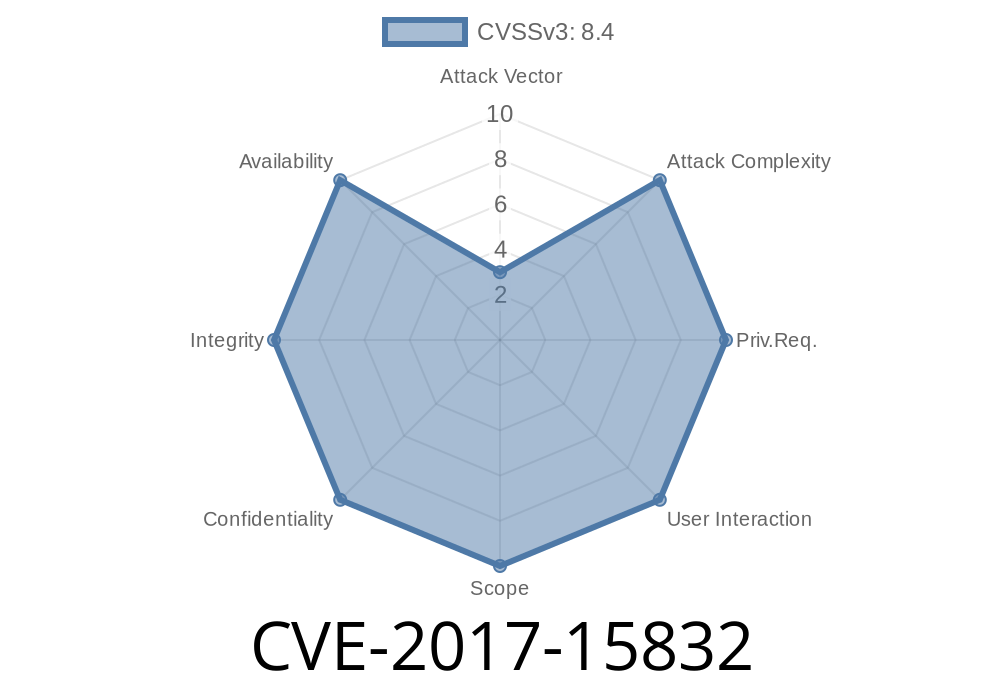In 2017, a vulnerability identified as CVE-2017-15832 was discovered in the WLAN host driver used on certain chipsets and OS platforms. This bug is a classic example of how a compromised WLAN firmware, running at a low level, can trigger a buffer overwrite in the host driver, paving the way for remote code execution or device instability.
This post breaks down the issue in plain English, provides a sample exploit scenario, code snippet, and references for CVE-2017-15832.
Overview: What is CVE-2017-15832?
CVE-2017-15832 describes a critical buffer overwrite bug in the handling of certain messages between the Wi-Fi firmware (FW) and the operating system (OS) driver (host driver). Firmware running on the WLAN chip communicates with the higher-level host driver over a shared API. If the firmware is compromised, either via a previous attack or malicious update, it can send intentionally malformed data to the host driver.
The host driver fails to check the bounds properly when handling this data. This causes a buffer overwrite, which is a classic form of memory corruption and can be exploited to run arbitrary code — potentially at kernel privilege levels.
Where Is The Vulnerability?
The bug lies in a function that parses packets sent from the firmware to the host driver. If the firmware sends an overly large payload or a payload with malformed length fields, the driver does not properly verify that the data fits inside its stack or heap buffer.
This might look like this simplified pseudo-code
void receive_fw_msg(uint8_t *data, size_t len) {
char buf[64];
// BUG: No check if len > 64!
memcpy(buf, data, len); // Overwrites buffer if len > 64
process_msg(buf);
}
If len is controlled by the firmware, and the attacker can compromise or control the firmware (a not uncommon scenario!), they can force the driver to overwrite its stack. This leads to classics like stack smashing, potentially hijacking execution flow in the kernel.
A user has a vulnerable device with affected WLAN hardware and driver.
- The attacker gains control over the WLAN firmware; this could be by exploiting another bug or by flashing a malicious firmware update.
Crash (denial of service)
- Escalation of privileges (to root/admin)
Proof-of-Concept Exploit
Here’s how a minimal, research-only proof-of-concept may look for a similar bug (for educational purposes):
#include <stdio.h>
#include <string.h>
void process_msg(char *buf) {
printf("Processing: %.8s\n", buf); // Display first 8 bytes
}
void receive_fw_msg(unsigned char *data, size_t len) {
char buf[64];
// Vulnerable: no length check
memcpy(buf, data, len);
process_msg(buf);
}
int main() {
unsigned char evil_data[128]; // Oversized, will cause overwrite
memset(evil_data, 'A', sizeof(evil_data));
// Fill with shellcode/payload in real exploit
receive_fw_msg(evil_data, 128); // len deliberately > 64
return ;
}
In a real driver, an attacker would use firmware-level control to send such oversized or malformed packets, often via a custom malicious firmware or payload injected through another bug. This code simply demonstrates the core vulnerability.
Links to Original References
- NVD Entry for CVE-2017-15832
- Original Discovery (KeenLab/Tencent)
- Technical Writeup (Project Zero)
Patch Your OS: Make sure your OS contains the latest security fixes for Wi-Fi drivers.
- Harden Drivers: Defensive coding is a must — always check buffer boundaries when copying data from untrusted sources (even if it’s just "internal" firmware).
Final Words
Even drivers that only talk to their "own" hardware can be attacked if the firmware is compromised. CVE-2017-15832 shows how trusting the integrity of embedded firmware can be a critical weakness.
Vendors must always validate *all* data received from firmware, and users should keep devices patched to prevent remote or local exploitation through bugs like these.
*This post is for educational purposes only. Do not attempt to exploit vulnerabilities on devices you don’t own, and always report discoveries responsibly!*
Timeline
Published on: 11/26/2024 09:15:04 UTC
